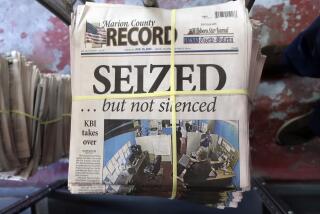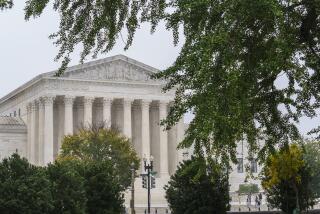Nasty? Yes. Criminal? No.
- Share via
In keeping with Shakespeare’s observation that “he that filches from me my good name ... makes me poor indeed,” someone suing for libel ordinarily seeks financial compensation from the person or publication that injured his or her reputation. But archaic laws in several states also allow libel to be prosecuted as a criminal offense, and a Colorado man accused of defaming his ex-girlfriend online now faces the possibility of 18 months in prison.
The prosecution of J.P. Weichel is an affront to the 1st Amendment, and a federal or state court should declare Colorado’s law unconstitutional. Allowing the prosecution to proceed any further also would encourage prosecutors in 14 other states with criminal-libel laws to resurrect this “crime” in response to trash talk on the Internet. That in turn might galvanize legislators in states without such laws to enact them. The 1st Amendment would be the loser.
Many Americans will be surprised that the offense of criminal libel exists, though they may remember from history class that in 1798, Congress passed a Sedition Act making it a crime to engage in “malicious writing against the government of the United States.” The law, which later lapsed, would be declared unconstitutional today because it punished political speech.
Weichel was not criticizing the government when he posted on Craigslist, under the heading “rants and raves,” accusations that his former girlfriend had committed child abuse and welfare fraud and had engaged in sex with a “crooked” lawyer. Such comments were clearly damaging, and Weichel should have been prepared for a civil lawsuit. What he shouldn’t have expected was that he would be charged with a crime.
Criminal law is primarily designed to promote the public good, not redress private grievances. Even the Sedition Act, a naked attempt to suppress political speech, was clothed in the language of public safety, linking criticism of officials to the creation of “unlawful combinations against the government.” No threat to public safety was posed by Weichel’s posts.
Criminalizing libel, as one expert told The Times, replaces a scalpel with a sledgehammer by forcing a defendant to contend in court with the power of the state, not with a plaintiff whose own conduct can be made an issue. Ironically, such laws may have survived for so long because they are almost never enforced; when they have been, courts have intervened, citing constitutional guarantees of free speech. It might be harder to check the use of criminal libel if the offense becomes more popular with lawyers and legislatures because of defamation on the Internet. But libel online, like all libel, is best redressed by replenishing the plaintiff’s purse, not by turning the defendant into a criminal.
More to Read
Sign up for Essential California
The most important California stories and recommendations in your inbox every morning.
You may occasionally receive promotional content from the Los Angeles Times.










